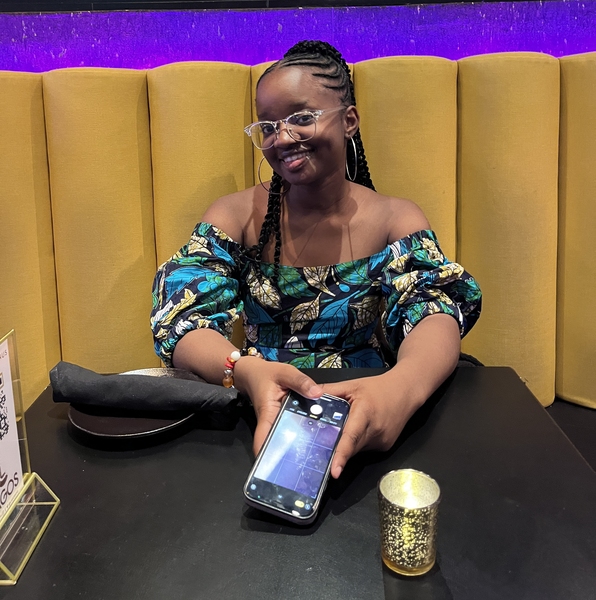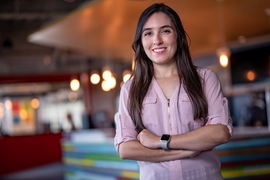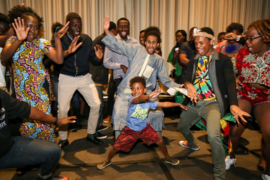This interview is part of a series from the MIT Department of Electrical Engineering and Computer Science featuring students answering questions about themselves and life at the Institute. Today’s interviewee, Victory Yinka-Banjo, is a junior majoring in MIT Course 6-7: Computer Science and Molecular Biology. Yinka-Banjo keeps a packed schedule: She is a member of the Office of Minority Education (OME) Laureates and Leaders program; a 2024 fellow in the public service-oriented BCAP program; has previously served as secretary of the African Students’ Association, and is now undergraduate president of the MIT Biotech Group; additionally, she is a SuperUROP Scholar; a member of the Ginkgo Bioworks' Cultivate Fellowship (a program that supports students interested in synthetic biology/biotech); and an ambassador for Leadership Brainery, which equips juniors/leaders of color with the resources needed to prepare for graduate school. She recently found time to share a peek into her MIT experience.
Q: What’s your favorite building or room within MIT?
A: It has to be the Broad Institute of MIT and Harvard on Ames Street in Kendall Square, where I do my SuperUROP research in Caroline Uhler's lab. Outside of classes, you're 90 percent likely to find me on the newest mezzanine floor (between the 11th and 12th floor), in one of the UROP [Undergraduate Research Opportunities Program] rooms I share with two other undergrads in the lab. We have standing desks, an amazing coffee/hot chocolate machine, external personal monitors, comfortable sofas — everything, really! Not only is it my favorite building, it is also my favorite study spot on campus. In fact, I am there so often that when friends recently planned a birthday surprise for me, they told me they were considering having it at the Broad, since they could count on me being there.
I think the most beautiful thing about this building, apart from the beautiful view of Cambridge we get from being on one of the highest floors, is that when I was applying to MIT from high school, I had fantasized working at the Broad because of the groundbreaking research. To think that it is now a reality makes me appreciate every minute I spend on my floor, whether I am doing actual research or some last-minute studying for a midterm.
Q: Tell me about one interest or hobby you’ve discovered since you came to MIT.
A: I have become pretty involved in the performing arts since I got to MIT! I have acted in two plays run by the Black Theater Guild, which was revived during my freshman year by one of my friends. I played a supporting role in the first play called “Nkrumah’s Last Day,” which was about Ghana at a time of governance under Kwame Nkrumah, its first president. In the second play, a ghost story/comedy called “Shooting the Sheriff,” I played one of the lead roles. Both caused me to step way out of my comfort zone and I loved the experiences because of that. I also got to act with some of my close friends who were first-time stage actors as well, so that made it even more fun.
Outside of acting, I also do spoken word/poetry. I have performed at events like the African Students Association Cultural Night, MIT Africa Innovate Conference, and Black Women’s Alliance Banquet. I try to use my pieces to share my experiences both within and beyond MIT, offering the perspective of an international Nigerian student. My favorite piece was called “Code Switch,” and I used concepts from [computer science] and biology (especially genetic code switching), to draw parallels with linguistic code-switching, and emphasize the beauty and originality of authenticity. This semester, I’m also a part of MIT Monologues and will be performing a piece called “Inheritance,” about the beauty of self-love found in affection transferred from a mother.
Q: Are you a re-reader or a re-watcher — and if so, what are your comfort books, shows, or movies?
A: I don’t watch too many movies, although I used to be obsessed with all parts of “High School Musical;” and the only book I’ve ever reread is “Americanah.” I would actually say I am a re-podcaster! My go-to comfort-podcast is this episode, “A Breakthrough Unfolds”, by Google DeepMind. It makes me a little emotional every time I listen. It is such an exemplification of the power of science and its ability to break boundaries that humans formerly thought impossible. As a computer science and biology major, I am particularly interested in these two disciplines’ applications to relevant problems, like the protein-folding problem discussed in the episode, which DeepMind's solution for has caused massive advances in the biotech industry. It makes me so hopeful for the future of biology, and the ways in which computation can advance human health and precision medicine.
Q: Who’s your favorite artist?
A: When I think of the word 'artist,' I think of music artists first. There are so many who I love; my favorites also evolve over time. I’m Christian, so I listen to a lot of gospel music. I’m also Nigerian so I listen to a lot of Afrobeats. Since last summer, I’ve been obsessed with Limoblaze, who fuses both gospel and Afrobeats music! KB, a super talented gospel rapper, is also somewhat tied in ranking with Limo for me right now. His songs are probably ~50 percent of my workout playlist.
Q: It’s time to get on the shuttle to the first Mars colony, and you can only bring one personal item. What are you going to bring?
A: Oooh, this is a tough one, but it has to be my Brass Rat. Ever since I got mine at the end of sophomore year, it’s been nearly impossible for me to take it off. If there’s ever a time I forget to wear it, my finger feels off for the entire day.
Q: Tell me about one conversation that changed the trajectory of your life.
A: Two specific career-defining moments come to mind. They aren’t quite conversations, but they are talks/lectures that I was deeply inspired by. The first was towards the end of high school when I watched this TEDx Talk about storing data in DNA. At the time, I was getting ready to apply to colleges and I knew that biology and computer science were two things I really liked, but I didn’t really understand the possibilities that could be birthed from them coming together as an interdisciplinary field. The TEDx talk was my eureka moment for computational biology.
The second moment was in my junior fall during an introductory lecture to “Lab Fundamentals for Bioengineering,” by Professor Jacquin Niles. I started the school year with a lot of confusion about my future post-grad, and the relevance of my planned career path to the communities that I care about. Basically, I was unsure about how computational biology fit into the context of Nigeria’s problems, especially because my interest in the field is oriented towards molecular biology/medicine, not necessarily public health.
In the U.S., most research focuses on diseases like cancer and Alzheimer’s, which, while important, are not the most pressing health conditions in tropical regions like Nigeria. When Professor Niles told us about his lab’s dedication to malaria research from a molecular biology standpoint, it was yet another eureka moment. Like, Yes! Computation and molecular biology can indeed mitigate diseases that affect developing nations like Nigeria — diseases that are understudied, and whose research is underfunded.
Since his talk, I found a renewed sense of purpose. Grad school isn’t the end goal. Using my skills to shine a light on the issues affecting my people that deserve far more attention is the goal. I’m so excited to see how I will use computational biology to possibly create the next cure to a commonly neglected tropical disease, or accelerate the diagnosis of one. Whatever it may be, I know that it will be close to home, eventually.
Q: What are you looking forward to about life after graduation? What do you think you’ll miss about MIT?
A: Thinking about graduating actually makes me sad. I’ve grown to love MIT. The biggest thing I’ll miss, though, is Independent Activities Period (IAP). It is such a unique part of the MIT experience. I’ve done a web development class/competition, research, a data science challenge, a molecular bio crash course, and a deep learning crash course over the past three IAPs. It is such an amazing time to try something low stakes, forget about grades, explore Boston, build a robot, travel abroad, do less, go slower, really rejuvenate before the spring, and embrace MIT’s motto of “mind and hand” by just being creative and explorative. It is such an exemplification of what it means to go here, and I can’t imagine it being the same anywhere else.
That said, I look forward to graduating so I can do more research. My hours spent at the Broad thinking about my UROP are always the quickest hours of my week. I love the rabbit holes my research allows me to explore, and I hope that I find those over and over again as I apply and hopefully get into PhD programs. I look forward to exploring a new city after I graduate, too. I wouldn’t mind staying in Cambridge/Boston. I love it here. But I would welcome a chance to be somewhere new and embrace all the people and unique experiences it has to offer.
I also hope to work on more passion projects post-grad. I feel like I have this idea in my head that once I graduate from MIT, I’ll have so much more time on my hands (we’ll see how that goes). I hope that I can use that time to work on education projects in Nigeria, which is a space I care a lot about. Generally, I want to make service more integrated in my lifestyle. I hope that post-graduation, I can prioritize doing that even more: making it a norm to lift others as I continue to climb.








